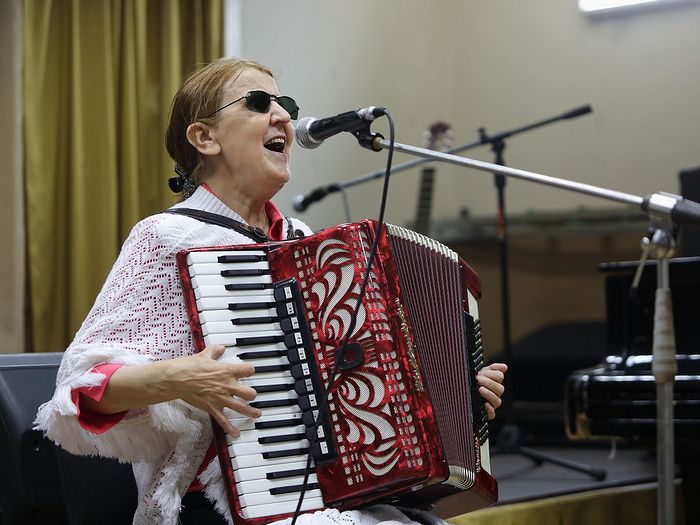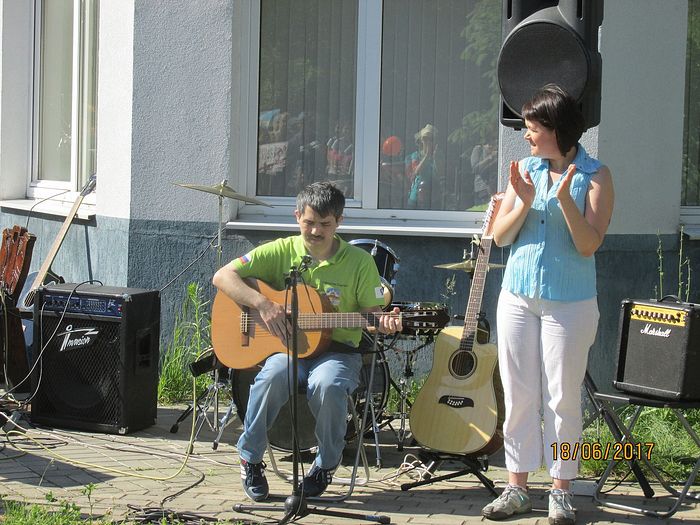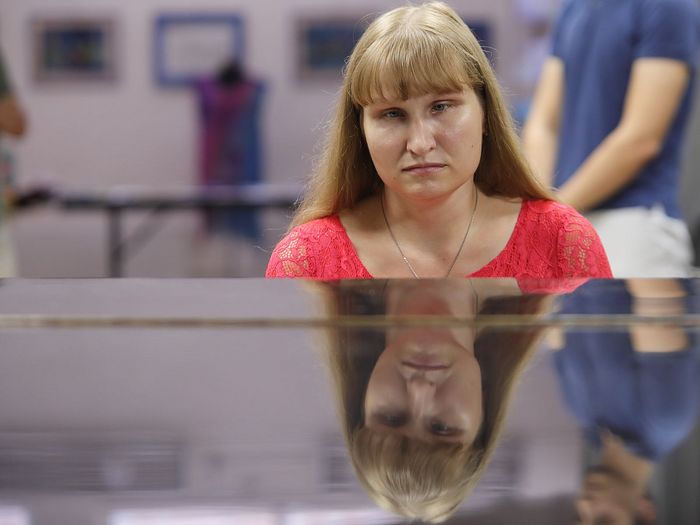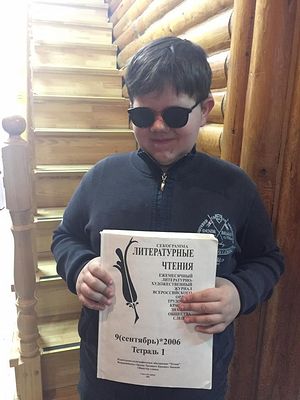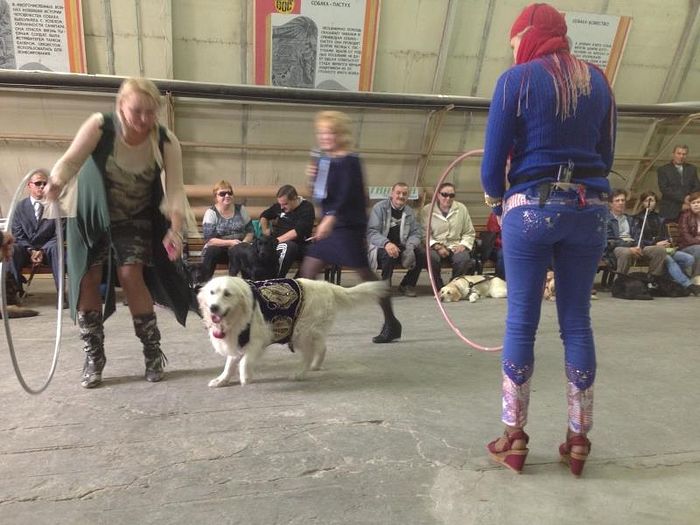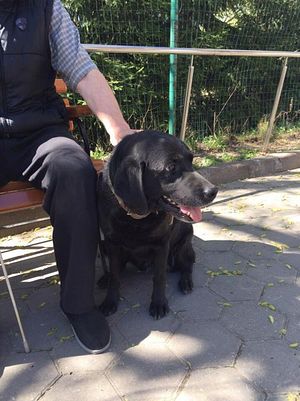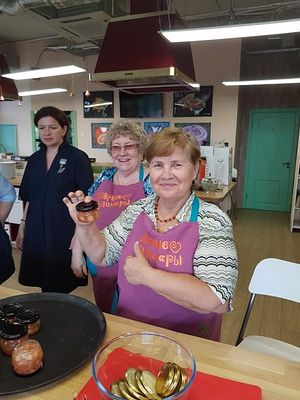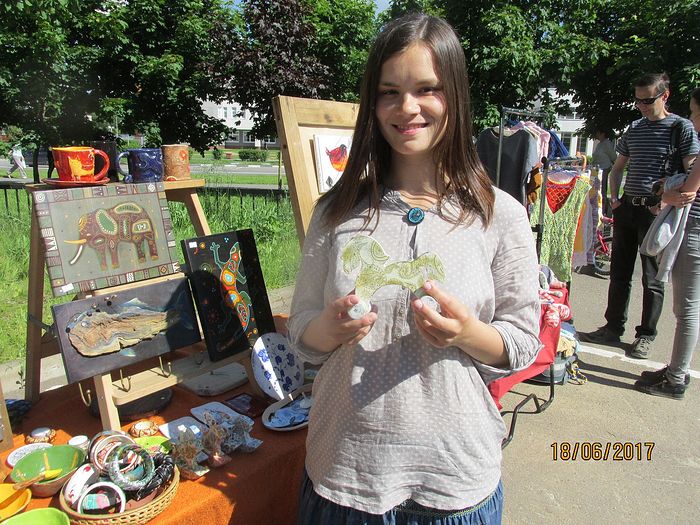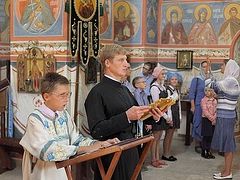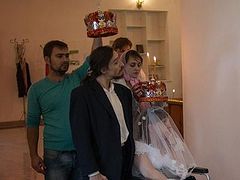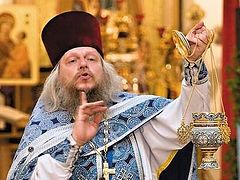Can deaf people really sing?! Yes, they can!
How can you find God if you can’t see and hear anything? True, even sighted people never saw God and hearing people never heard Him. Yet all of them see the beauty of His creation and hear its sounds, and it seems that it is easier for them to believe that all of this was created by God…
I learned who and what helps deafblind people find the path to the Church and live in the world of colors and sounds without seeing and hearing them last year at the “Do Good” II Art Festival, organized for the support of the Deafblind Home in Puchkovo [a boarding school and rehabilitation center in Puchkovo, a village within the town of Troitsk, known for its scientific research, historically to the southwest of Moscow, since 2012 within New Moscow area.—Trans.] at the Troitsk House of Scientists of the Troitsk Scientific Center of the Russian Academy of Sciences in Troitsk. Then a blind musician named Ruslan came from Dagestan to take part in the concert and wonderfully played the guitar and sang. On June 3, 2018, a student of the Deafblind Home Bogdan performed here at IV Festival; and on August 16, Tatiana, who came from Ryazan, performed beautiful Russian love songs at the home’s graduation party, during which the deafblind students were solemnly awarded leaving certificates.
Neither blindness nor hearing impairment prevents Tatiana from singing and playing the accordion very beautifully. Though three years ago, when the woman lost her beloved husband, she stopped singing and her accordion fell silent. But it was at the Deafblind Home that she started to sing again, giving joy to the grateful listeners, most of whom are visually and hearing impaired. Teachers of the Deafblind Home sang with all their hearts to the accompaniment of the guitar and the grand piano after her at the graduation party. They also recited poetry with their students.
On July 30, one of the winners of the IX International Festival Contest of Orthodox and Patriotic Song “Arzamas Domes” was the Obychnye Lyudi (“Ordinary People”) duet from Rybinsk. The winners of II degree diploma (nomination: “bard song”) were the guitarist Anatoly Batrakov and the poet, composer, singer, and song-writer Galina Lupandina (who is almost blind but can hear) from the Yaroslavl region. Galina’s beautiful singing doesn’t surprise anybody, which is also the case with the famous modern Russian-Georgian blind singer Diana Gurtskaya. As for the deafblind, their singing surprises everybody. How can you sing if you have hearing loss and can’t hear yourself sing?
The film on the unusual concert of deaf and deafblind singers “Singing Voices” was shot on April 30, 2017, on the feast of the Holy Myrrh-Bearing Women. Among the participants were students of the rehabilitation center for the deafblind in Puchkovo and the Desnitsa (“Right Hand”) Coordination Center for Work with the Deaf and Hard of Hearing, along with parishioners and volunteers of the Church of the Kazan icon of the Holy Theotokos in Puchkovo, where the father-confessor of the Deafblind Home and member of the Committee for Social Work of the Vicariate of the New Territories of Moscow, Priest Lev Arshakyan, serves. The concert was preceded by the sign language Liturgy.
In 2014, the film director Alexander Sulyakov shot a documentary “On the Fingertips”, dedicated to deafblindness, one of the most severe disabilities in the world, and the activities of the Deafblind Home In Puchkovo. Since September 2013 visually and hearing impaired and deafblind students have received social, spiritual, and psychological rehabilitation at this educational, spiritual and rehabilitation center.
These words, written on the Facebook page of the Deafblind Home in Puchkovo, are not an empty phrase. To lead people who have no vision and no hearing to Christ is the primary task of the center’s founders. They strive to help people with this severe impairment not only learn and master the Braille alphabet, computer and modern technologies, take care of themselves, develop orientation and mobility skills, but also “see” the invisible spiritual world that was perfectly seen by the saints who became blind, such as the Blessed Matrona of Moscow, Holy Hierarch Luke of Crimea, and Archpriest Valentin Amfiteatrov (though the latter has not been canonized so far, a large number of films and books are dedicated to his miraculous help).
People come to Puchkovo from all over Russia to learn to find their bearings and communicate with others. But during their pilgrimage trips, participation in church services, the sacraments of Confession and Communion, and conversations with priests, the most important meeting in the lives of many of them takes place, namely the meeting with God. True, it is very difficult even to lead healthy unchurched people to Christ. And how to show the path to the Church to those who come to the Home for the Deafblind for one or two months? People take them to church, but they can see neither golden domes, nor paintings, nor the images of the Lord, His Most Pure Mother and saints on holy icons… Nor can they hear the choir sing. Yet they can feel the invisible presence of God the Almighty, and it is possible not only in church. It is also in the care that the Deafblind Home staff and its friends provide, in the good attitude and warmth of the hands of volunteers and sign language interpreters, in aid given by perfect strangers.
The things which are impossible with men are possible with God (Lk. 18:27). It is by His will that the Deafblind Home in Puchkovo, a philanthropic project without any state involvement, has functioned for already five years solely through donations of individuals and organizations. As soon as On May 29, 2017, Fr. Lev Arshakyan in the “Lessons of Mercy” program on the Russian Orthodox Spas TV channel told the presenter Vladlena Kalashnikova and the viewers many interesting facts about the Deafblind Home and its people, viewers phoned all day long, saying warm words and giving donations. Many understood how important it was to support this noble undertaking.
We discovered “the country of the deaf” thanks to the actresses Dina Korzun and Chulpan Khamatova, who brilliantly played leading roles in a feature film with the same name by Valery Todorovsky. However, most of us haven’t yet discovered the world of the deafblind and know so little about the life of these very special people. It’s a high time to shoot a feature film or series of TV novellas about them with real stories from their lives. For example, they can show how a deafblind man helps his guide dog that lost its eyesight cross the road in an unfamiliar place; how blind cooks expertly handle the knife while cooking dinner in their kitchen; how they make jam, knit, swim, sing, go on pilgrimages to holy sites…
I personally have first-hand knowledge of the problems of blind and deaf people. My brother Oleg went blind due to diabetes. My landlady Svetlana Chekalkina, who gave me shelter in her apartment in April this year and has since become my friend [earlier the author of this article and her daughter literally became homeless when their house was destroyed by fire.—Trans.], has a hearing disability. Quite often we can meet blind people in streets, walking with a white stick or a guide dog, or deaf people actively communicating by sign language. But before my visit to Troitsk I had never seen them who could neither see nor hear. It may seem that those who cannot see and hear the beauty of this world are absolutely helpless and unable to realize their God-given talents. But that’s not true, provided they are supported by their relatives, care-givers, or Braille and sign language interpreters.
Special people
How do people become deafblind? The reasons are varied. One mischievous girl disobeyed her mother and began to cut off sunflowers, moving the knife towards herself and not away from herself, and thus hurt her eye. At night a drunken surgeon while removing this eye damaged the other eye and her auricular nerve. And there are so many such incidents all over Russia!
On May 29, 2017, Irina brought her ten-year-old son Volodya [a diminutive form of the name Vladimir] to Puchkovo. This boy has had problems with vision and hearing since infancy. The cause was his brain tumor that was detected when he was six. But the mother and her son are not despondent and are not going to give up. Little Volodya has such a thirst for knowledge that the teachers admit they have never seen such an inquisitive boy before. According to Evgenia Lagunina, she enjoys teaching Volodya computer literacy as he picks up everything in a jiffy. The boy reads both Russian and English books in Braille with pleasure and adores creative activities. He has made a pencil case for himself.
It is amazing that deafblindness doesn’t impede the ability of men and women to love each other and marry. For example, there is a model close-knit family of Vladislav and Natalia Demianenko from St. Petersburg. Peace and mutual understanding reign in this family as the spouses treasure every kind word and every demonstration of love. However, there are many lonely people among the deafblind community who feel unwanted. But after coming to Puchkovo they rediscover both the world around them and themselves.
The twenty-four-year-old Amir came to Puchkovo from Makhachkala [the capital city of the Republic of Dagestan, Russia]. He was born deaf but was sighted. Nobody knew that this active boy would be injured in a football pitch at the age of fifteen and that his favorite game would cause his loss of sight due to the detachment of the retina. Even ten operations didn’t save his eyesight. Amir had been very depressed until he made new friends in Puchkovo, where he had an individual rehabilitation program. The interpreter Inessa taught him to find his bearings and overcome his fear of going outdoors independently. And the young man began to smile, as did the lonely young woman Inessa from Sarapul [a town in the Udmurt Republic, Russia].
“What’s the point of living if you are totally blind and almost deaf?” Inessa Zaitseva often thought. When she came to Puchkovo three years ago, this woman resembled a weak-willed little girl or a fragile porcelain doll. But people whom she hadn’t known before supported her and she no longer felt useless. The cook Natasha took her to concerts at the Olimpiyskiy Arena. And how happy she was when the friends of the Deafblind Home within one day raised about 40,000 rubles (about USD 595) for Inessa to buy a computer! The woman with tears on her eyes thanked all who had responded and generously helped her.
The Deafblind Home’s students Tatiana, Bogdan, Kristina, Svetlana, Nina, Alexander, Vladimir and Konstantin told Natalia Beskhlebnaya how they see and perceive this world (e.g. a star, a horse, an ostrich, a house).
A storyline for the movie “My Blind Guide dog”
Students leave the Deafblind Home completely transformed. They begin to feel like a part of society (though, of course, they need sighted and hearing assistants) rather than “disabled” and “a burden”. And often a guide dog becomes an indispensable assistant. Sometimes such incredible stories occur in real life that no writer or moviemaker could ever create.
Did you know that residents of over sixty countries of the world celebrate the International Guide dog’s Day on the last Wednesday of April every year? Currently Russia has two centers where guide dogs are trained to help blind and poor-sighted people move out in the open without problems. These are the Republican School of Vocational Rehabilitation of Blind People and Training of Guide dogs (founded in 1960) and the Autonomous Nonprofit Organization the Training and Cynological Center “Dog-Assistants of the Disabled People” (founded in 1999). Dogs are trained for nearly half a year, learn the skills of guiding blind people across the streets and in transport, the rules of conduct in public places, and undergo a general training program. Thereupon they take a test and are introduced to their future owners.
For a blind man a guide dog is not only a “mobility aid” outdoors and at home, but also (and above all) a friend he can share his joys and sorrows with. “Friends never betray each other,” Igor Semenov, a student of the Deafblind Rehabilitation Home, is convinced. He came to Puchkovo together with his second guide dog Umbi, which had lost its sight.
When his first guide dog died, Igor’s nearest and dearest were frustrated and he decided not to get another guide dog. But then he thought: “How can you imagine your life without a friend with whom you can travel and go to your summer house in the village?” Igor relates: “At the dog training school in the town of Staraya Kupavna near Moscow, Umbi and I got accustomed to one another at a two-week course. Assisted by an instructor, Umbi took a specially prepared route within the school and taught me to walk the dog, to bypass obstacles and to take care of it. And when we got home, it was my turn to show Umbi my own routes from home to my job, the outpatients’ clinic, and shops.”
But three years later Umbi, a sociable and kind dog, fell ill and began to stumble over items. Igor’s family had no money for its treatment. The same dog-training school recommended the Igor exchange Umbi for a healthy dog, but the man refused pointblank, saying that Umbi was like a child for him and he would never do it. On the initiative of Sergey Sirotkin, President of the “Elvira” Association for the Social Protection of the Deafblind in Russia, contributor to Foma Orthodox magazine Yuri Pushchayev along with the Deafblind Home’s staff raised funds to cover a medical operation for Umbi.
The required sum was transferred to Puchkovo where Igor came with Umbi. His four-legged friend was operated on, but it didn’t help. The blind Umbi still leads its owner along the familiar routes, and Igor in his turn helps it cross the road in unfamiliar places.
Igor believes that Umbi is even unconscious of its sight loss, for it feels that its primary duty is to help its master and to worry about his life and safety rather than itself. This is an amazing story about two blind creatures of God, a man and a dog, and their devotion and faithfulness to one another.
Life with the Braille language
The Deafblind Home and Rehabilitation Center in Puchkovo resembles a school where during the period of one to two months of study you need to absorb the knowledge that will be meaningful and helpful in your life. There are four main fields in the course of study. Firstly, it is the Braille alphabet—the principal system of reading and writing by touch for the blind. It consists of arrangements of raised dots which make up letters, numbers, punctuation marks, etc., and it is read with the fingertips. When a French boy of genius, Louis Braille, invented this system some 200 years ago, he couldn’t have imagined that in the twenty-first century deafblind [and, in effect, the blind too, albeit most of them prefer speech synthesizers] people would be able to use the computer, the internet, the cellphone, and various gadgets by means of the Braille display reader that translates the text from the monitor into Braille, thus opening the window to the world of the sighted and hearing people. These people even can type the text on computer and print it with the Braille printer [equipped with a special Braille embosser]. Secondly, it is computer literacy. Nothing is more rewarding for our teachers than receiving letters of thanks from those who were under their care. All the graduates write these messages themselves. Thirdly, it is social adaptation which includes orientation and mobility, cooking, self-care, and developing many other important living skills. Fourthly, it is learning applied crafts and creative work. In addition to this, those staying in Puchkovo go on excursions and attend other cultural events, take fitness and exercise programs, receive psychological and spiritual support, go on pilgrimage trips, and attend church services.
Wondrous Diveyevo and other Orthodox holy places
Nina Gvozdeva shared information on the pilgrimages to Murom and Diveyevo Convent made by a group of parishioners from the Church of the Kazan icon in Puchkovo and some of the Deafblind Home’s students. “Five persons with deafblindness travelled with us. Natasha and Lyuba [a diminutive form of the name Lyubov] are totally deaf but can see a little. They use sign language to communicate. Lena is with both visual and hearing impairments; she uses a hearing aid, displays mastery of sign language, and speaks quite well. Sasha [a diminutive form of the name Alexander] is totally deaf and totally blind, but he is good at using sign language and tactile signing to communicate. Tamara is blind and has some useful hearing, so we communicate with her by speaking. Teachers, staff workers of the Home for the Deafblind and volunteers were with us too.” Prayer accompanied the pilgrims throughout their journey to and from Diveyevo. They read the Theotokos prayer rule [repeating the hymn “O Theotokos and Virgin, rejoice” up to 150 times.—Trans.] together, read the prayers and canons before Holy Communion, and took Holy Communion at Diveyevo together.
Another time, in the town of Pereslavl-Zalesskiy, the pilgrims visited the Monastery of St. Nicetas (Nikita) the Stylite, immersed themselves in his holy well, venerated his relics and the chains the ascetic would bind himself in, and descended to the “chapel/pillar” where the ascetic would spend time reciting the Jesus Prayer on bended knees. Then they visited the Transfiguration Cathedral where St. Alexander Nevsky was baptized. They also venerated the miracle-working “Andronikovskaya” icon of the Theotokos at St. Theodore’s Convent in this town.
In addition, they made a pilgrimage trip to the Life-Giving Cross of the Lord in Godenovo. According to tradition, local shepherds saw a cross in an ineffable light that seemed to be hanging in the air. The voice from the cross predicted that a house of God would appear on the site of the swamp, and all comers would be healed according to their faith. Miracles continue to occur there to this day.
A plane and a heart—the symbol for the “Do Good” Festival
The Deafblind Home needs large amounts of money for its activities and trips. Where can it get this money? From generous people. On June 18, 2017, many of them gathered at the Troitsk House of Scientists to “Do Good” II Charity Art Festival. The Festival was held there in December 2017, and on June 3 this year IV Festival was organized on the House of Scientists’ territory. This time funds were raised not only for the Home for the Deafblind, but also for the center for autistic people in Puchkovo. Unfortunately, there were fewer attendees at the festival than last summer.
“It is very sad. We wish more people could attend these festivals, have fun and do good at the same time. Be sure and come next time, and we will do our best to organize good events for you!” the author of the idea and one of the main organizers Olga Patovina said.
Perhaps all of us folded and flew paper airplanes in childhood. A little white airplane with a little red heart are the official emblem and logo of the festival; for doing good is as easy as making a paper airplane with a piece of paper (photo of 1974).
All the guests and participants of the festival complimented the director and staff workers of the Troitsk House of Scientists, this oasis of culture, for the excellent concerts, the friendly and warm atmosphere, and the organization of creative masterclass series.
Deafblind cooks
Can we give a knife to a deafblind person and ask him or her to cook dinner? Yes, it’s possible! First deafblind people don’t believe this themselves, but you must see this joy on their faces when they try the food that they cook with their own hands under the direction of the cooking teacher Tatiana! A handicapped person can achieve a lot, provided we assist and guide him a little, helping him move forward. But he simply cannot get along without our care.
Volunteers
The Deafblind Home desperately needs not only financial resources but also volunteers, who can communicate and walk with those under its care, accompany them to excursions, play board games with them, helping them overcome their loneliness and break out of their closed space into the world. Many volunteers become genuine friends to people with deafblindness.
How can one communicate with the deafblind? You can speak with those who have useable residual hearing and use sign language to communicate with those who have residual vision. Many deafblind people well understand regular letters so you can write them on their palms. Sometimes it is sufficient to hold a deafblind person’s hand tight—he will immediately understand what you want from him. If volunteers know neither sign language nor tactile signing, they initially can speak with the students who understand speech. Later volunteers learn both sign language and tactile signing and even master them.
In addition to computer courses for the deafblind, the Deafblind Home offers the professional skills course for those who escort disabled students and free sign language lessons for volunteers. Additionally, analytic work on and study of deafblindness is conducted here.
A Paradise apple and dandelion honey
Guests of the “Do Good” Festival’s charity fairs could buy toys, pictures, souvenirs, designer clothes, cushions, jam, tea, candles, and many other items. I personally purchased little jars of jam with the label, “Puchkovo jam. Made with love”. I obtained only “dandelion honey” and “Paradise apple in plum syrup” and regretted not having bought more as it was very delicious!
The Deafblind Home was founded not by the state but by deafblind people themselves and those who are not indifferent to them. While its workers regularly apply for state grants and are happy to receive any state support, they don’t want the Deafblind Home to change into a state-run boarding-school with very different rules. That is why the Deafblind Home needs financial support permanently. You can donate online here:
http://www.domsg.ru/site.aspx?IID=2873274&SECTIONID=2552305
Address: 108807, Moscow, Poseleniye Pervomayskoye, Derevnya Puchkovo, Dom 1-a. The recipient: Dom Slepoglukhikh (the Deafblind Home).
Telephone: 499-271-71-13.
Email (Sergey Alexeevich Sirotkin, President of the “Elvira” Association for the Social Protection of the Deafblind): info@vosg.ru.
Photos from the Deafblind Home’s archive
http://www.pravoslavie.ru/115285.html

